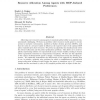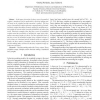18 search results - page 2 / 4 » Representing risk preferences in expected utility based deci... |
ESORICS
2007
Springer
13 years 11 months ago
2007
Springer
Current trust models enable decision support at an implicit level by means of thresholds or constraint satisfiability. Decision support is mostly included only for a single binary...
JAIR
2006
13 years 5 months ago
2006
Allocating scarce resources among agents to maximize global utility is, in general, computationally challenging. We focus on problems where resources enable agents to execute acti...
EUSFLAT
2009
13 years 3 months ago
2009
In this paper, the notion of a fuzzy vector of normalized weights is introduced, and its application in decision making models based on the weighted average operation is studied. T...
AIPS
1996
13 years 6 months ago
1996
Mostexisting decision-theoretic planners represent uncertainty about the state of the world with a precisely specified probability distribution over world states. This representat...
GECCO
2010
Springer
13 years 5 months ago
2010
Springer
This paper takes an economic approach to derive an evolutionary learning model based entirely on the endogenous employment of genetic operators in the service of self-interested a...


